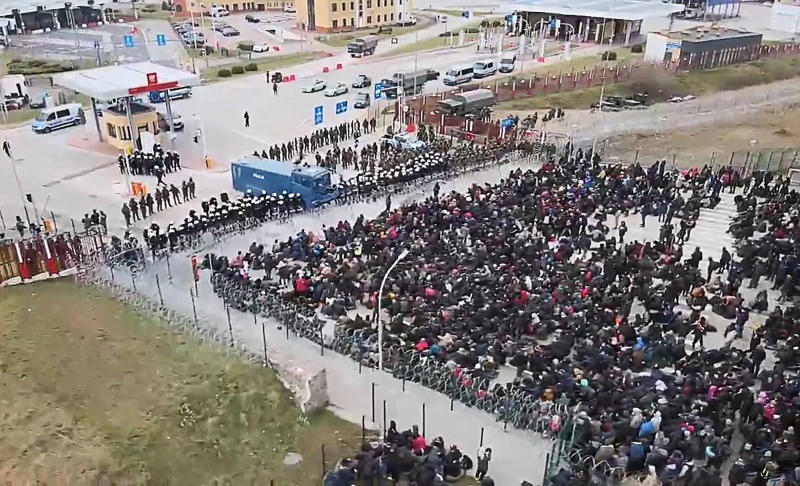„Thousands of migrants tried to get to Poland last night“, „The Poland-Belarus border was rather calm last night“, „Crisis on the Poland-Belarus border intensifies“, „Polish security forces use water cannons and flash grenades against migrants“ – these headlines are just a fragment of what we could see in the past months. As a TV reporter from Czechia, I was not only reading these headlines, but also creating them. However, does the perspective of the border crisis differ in uninvolved countries? How the Czech media, and more importantly, ordinary Czech people, see the border crisis?
František Lavička

Fot. State Border Committee of Belarus / PAP/ITAR-TASS
First of all, I feel like I need to make a quick disclaimer and admit that I am not able to make a valuable comparison of Poland and Czechia as I am not particularly familiar with the prevailing point of view of Polish media and/or ordinary Poles. Therefore, I would rather focus on the Czech view as a whole.
In contrast to the European migrant crisis, this crisis, despite the ground on which it is happening being much closer to us now than before, it has not affected the ordinary Czech at such scale. Then, we could see huge rise of anti-immigrant political parties. Nowadays, well, it may be too early to evaluate the ongoing process, but as far as I am concerned, it barely resonates throughout the masses.
Multiple explanations come into my mind. First, we may be tired of the migrant crisis talk because we have already spent about five years discussing the matter in depth. We could say the same about covid-19 which has been a matter of general discussions for almost two years.
Second, the topic of border crisis is not seen as a Czech issue. These Middle-Eastern migrants do not want to come to Czechia which means that Czech folk remains quite calm. All in all, vast majority of them probably does not want to come to Poland, either. Germany is the highly targeted destination but that’s another story.
Third, the prevailing perception is, I reckon, that the border crisis is a political game. A game of Chess between Belarus autocrat Alexander Lukashenko and the European Union. Poland (and partly Lithuania as well, let’s not forget) is just a mediator here. Do not take me wrong, Poland plays a crucial role of keeping the border closed, therefore fulfilling the Schengen Borders Code. But it is the European sanctions imposed against Belarus that are, among others, the problem.
Finally, we should not forget about the fact that journalists and humanitarian workers are forbidden to enter the secured area and get in the centre of events. Therefore, the media coverage is suppressed, and people do not see or read as much content that could draw their interest on a higher level.
The sad part is that Czech media almost unanimously rely on English language sources. Although the Czech and Polish language are quite alike, we rarely use Polish news as a primary source of information. In effect, this brings on potential misinformation. We - journalists - like to talk about hybrid wars and misinformation. Seldom do we realize that we can be victims of it ourselves, too. Furthermore, the danger is much bigger because of the mass audience we are able to „infect“ with incorrect information.
In summary, we could say that the average Czech person does not feel very stressed about the pending border crisis - at least compared to the European migrant crisis. And even though the Czechs sympathize considerably with a micro-level tragedy of a mere Iraqi, who was promised to get to the Germany without further ado, on a macro-level perspective, Czechs understand that Poland only abides by European rules.
František Lavička, TV Reporter, CNN Prima News
